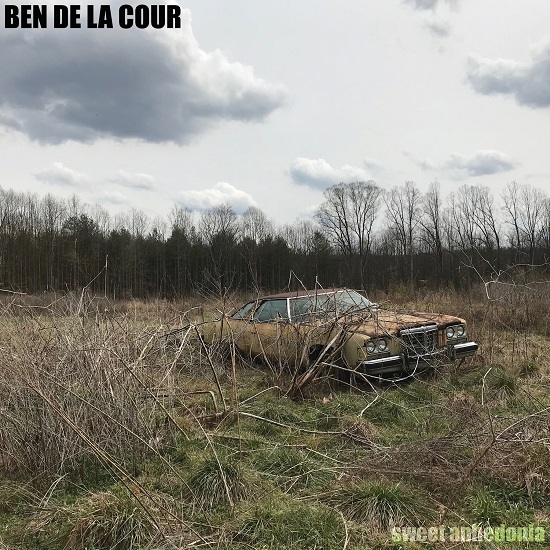
Usually the most difficult thing about reviewing music is working out where to start. Ben de la Cour solves that problem by giving the title song of his new album an enigmatic and intriguing title of ‘Sweet Anhedonia’. I had to look it up, and, logically enough, it comes from the same Ancient Greek root as hedonism and it means the inability to feel pleasure; it’s usually associated with illnesses such as depression. Maybe it’s just a coincidence, but there may be a reference to the 1996 Catatonia single, ‘Sweet Catatonia’. The title song, ‘Sweet Anhedonia’, is a melancholy exploration of this condition with a haunting triple time arrangement enhanced by delicate backing vocals and pedal steel.
There’s a lot more to Ben de la Cour than melancholy. There’s some wordplay in the song titles ‘Appalachian Book of the Dead’ and ‘Suicide of Town’, there are a couple of co-writes with very interesting songwriters, some great stories and some interesting arrangements. One of the co-writes, ‘Numbers Game’, was written with the gifted Canadian singer-songwriter Lynne Hanson and deals with the loading of life’s dice in favour of the privileged, set against a backdrop of finger-picked acoustic guitars, fiddle, pedal steel and Laurel Canyon harmonies.
Don’t run away with the idea that ‘Sweet Anhedonia’ is just a bunch of sad songs. The riff-driven ‘Suicide of Town’ is pure FM drivetime with a vocal that hints at Tom Petty and Rob Thomas and guitars playing off against each other, while ‘Shine on the Highway’ combines two electric guitars with fiddle and trumpet to create a song that would feel at home on a Greg Dulli solo album. And talking of influences, ‘American Mind’ hints at Jackson Browne’s apocalyptic feel from ‘Before the Deluge’, with the addition of Vietnam references and martial drumbeat (which is also a common theme throughout the album) for emphasis.
‘Palookaville’ features a series of characters that would fit in perfectly on any of the first three Springsteen album and uses Buddy Holly as an example of an artist whose legacy is untainted because he wasn’t around long enough to go downhill and either hit the skids or end up playing residencies in Vegas.
‘Sweet Anhedonia’ is a lyrically thought-provoking set of songs set against diverse musical backgrounds and textures, incorporating influences from Americana, folk, rock, pop and a whole lot more, skilfully blended to create a work that is entirely Ben de la Cour.
‘Sweet Anhedonia’ is released in the UK on Jullian Records (JR32CD/LP) on Friday October 13th.
Here’s the video for ‘Shine on the Highway’:
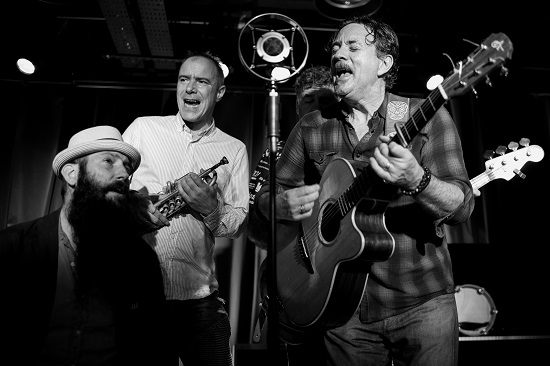
Whether you listen to one of their albums or you go to see Track Dogs live, there’s one thing you can guarantee; it won’t be predictable. The mix of musical influences brought to the band by Garrett Wall, Robbie K Jones, Howard Brown and Dave Mooney, in addition to the influences of their adopted hometown of Madrid, ensures that you won’t know what’s coming next. The title ‘Blind Summits & Hidden Dips’ sums it up perfectly as a metaphor for life in general and the album in particular. You can make the journey from Laurel Canyon to twelve-bar blues (with a twist) from one song to the next.
The rapid changes of direction and style flow naturally from a band with such a range of vocal and instrumental skills and diverse influences as the album’s first three songs demonstrate. The opener, ‘The Way of Things’, has a very Latin feel with trumpets that edge over into Gibson Brothers territory and even a Spanish vocal. It’s followed by ‘Cover Your Tracks’ which channels the seventies West Coast vibe with acoustic guitar and vibes and the customary smooth harmonies. The album’s third song, the slightly bawdy ‘Be Your Silver Bullet’, opens with Garrett Wall intoning the roll-call from the 1967 children’s series Trumpton before breaking in to a banjo and horns-driven I-IV-V blues progression. In true Track Dogs style, it’s anything but standard; there’s a guest appearance from sax legend Lou Marini and the song builds to a New Orleans jazz ending. As ever the harmonies are superb.
The album features a couple of covers, a fairly straightforward rendition of Lester Flatt’s ‘Sleep With One Eye Open’ and a Latin take on a song written by an American (Stevie Nicks) about a Welsh witch, with a guest vocal from Spanish singer Lu Garnet. ‘Rhiannon’ is very different from the Fleetwood Mac original with its ukulele, bass trumpet and vibes arrangement. To emphasise the album’s unpredictability, ‘Strange Days’ is a positive message about coming out of lockdown set against a reggae backbeat while ‘Disaster at Sea’ is a spoof sea shanty with a whimsical lyrical twist at the end. ‘Blind Summits & Hidden Dips’ is packed with inventiveness and surprises around every hairpin bend; you won’t get bored with this anytime soon.
‘Blind Summits & Hidden Dips’ is released on Friday October 6th in the UK on Mondegreen Records (MGR1023).
Here’s the video for ‘Cover Your Tracks’:
The best way to enjoy the full Track Dogs experience is to see them live so here’s a link to their upcoming UK tour dates.

How many songs by Scottish bands feature the word “rain”? ‘Raintown’, ‘Tinseltown in the Rain’, ‘Why Does it Always Rain on Me?’, and that’s before we even get to Dean Owens’ brilliant ‘Raining in Glasgow’ and all the rest. There’s a reason for that, of course, the same reason why ‘The Flood’ opens with the song ‘Edinburgh Rain’. The message isn’t always negative; rain has the power to clear the air and “Wash my blues away”.
Wayward Jane (Dan Abrahams, Sam Gillespie, Rachel Petyt and Michael Starkey) is an interesting idea, combining the basic elements of an Appalachian string band with some traditional Scottish folk influences. The end result is an original sound that’s somewhere between a string band , folk troubadour and ceilidh band mixing the influences subtly to create a sound that’s best described by the title of one of the instrumentals, ‘Doucement’ which translates as gently or softly. Wayward Jane take some of the harder edges away from the string band and soften them with Sam Gillespie’s wooden flute playing and laid-back performances.
The album’s a mixture of songs and instrumentals, mainly originals, but with the addition of a couple of reworkings, one the traditional song ‘Little Satchel’ and the other a fairly traditional string band version with lovely four-part harmonies of ‘Shake Sugaree’, the Elizabeth Cotten song that’s becoming an Americana standard.
To come back to that rain, the album has a watery theme running through it, including the banjo and fiddle-led ‘Didn’t It Rain’, telling the all-too-familiar story of catastrophic weather events in the Southern states. There are also three pieces back-to-back in the middle of the album with aquatic themes; ‘Crossing Over Water’ begins with two guitars and builds with fiddle and banjo to four-part instrumental harmony before Rachel Petyt comes in with a very traditional folk vocal, ‘The Flood’ is a typical string band instrumental giving all the players a chance to demonstrate their skills and ‘Down by the River’ has a country feel with unison banjo and fiddle and lovely harmonies.
What makes ‘The Flood’ so original is the varying textures created by the playing and the range of vocal styles. The instruments are used in every possible combination (particularly with the addition of wooden flute) to make each piece distinctive. It’s a lovely album with pleasant surprises wherever you turn.
‘The Flood’ is out now on ‘Down The River Records’ (WJ003) and you can still see the band at these tour dates.
Here’s the video of ‘Crossing Over Water’:
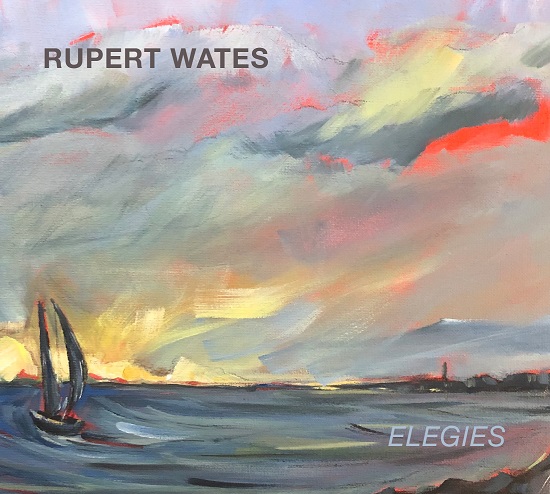
Bear with me while I get the nostalgia bit out of the way. There was a time in the 1970s when singer-songwriters from the folk world could become massive, making singles and albums that charted and selling out 2,000 capacity venues armed with only an acoustic guitar (usually a Gibson or a Martin at that time). It wasn’t just the odd one or two either; there was strength in depth as well. We had Ralph McTell, John Martyn and Richard Thompson (among others) in the UK and North American continent had Gordon Lightfoot, James Taylor and Neil Young (when he wasn’t squeezing squalls of feedback out of Old Black. Rupert Wates would have fitted in perfectly with his virtuoso finger-style guitar and mix of traditional and modern lyrical themes. Skip forward five decades and folk music’s a minority interest again. Which is why I have such a great admiration for artists like Rupert Wates. He does what he does in the knowledge that it’s a labour of love and that’s pretty common in certain areas of today’s music business.
The eleven songs on ‘Elegies’ are love songs but, as the title implies, they all convey a sense of loss as well. The musical stylings reflect the lyrical content of the songs; the more traditional folk-style lyrics tend to have fairly conventional guitar stylings while the contemporary lyrics lean towards a jazz feel, particularly when Trifon Dimitrov joins the party on double bass. Of the traditional lyrical songs, ‘Guinevere’ is based on ‘Malory’s ‘Morte d’ Arthur’ with hints of the Robin Hood legend, ‘Lady of the Glades’ is based on Keats’ ‘La Belle Dame Sans Merci’ and ‘Across the Water’ derives from Tennyson’s ‘Lady of Shalott’. ‘The Storm’, with its high-register vocal, is inspired by Poe and Coleridge and builds and darkens musically to reflect the ominous oncoming weather. ‘The Man Who Worked in Clay and Stone’ has a more modern feel and arrangement underpinning a message that you should be careful what you wish for because ultimate beauty is ultimately sterile.
Of the more modern lyrics, ‘Cathy’ is a love song with a smoky jazz club feel enhanced by the double bass, and ‘We’ll Go Dancing’ is a love song set in Paris that also hints at the speakeasy era of the 1930s in the States. It’s a mark of Rupert Wates’ craft that he’s able to create such a variety of moods with one or two guitars, occasional double bass and vocal.
‘Elegies’ is Rupert Wates’ twelfth album and it demonstrates perfectly why he’s an award-winning songwriter and performer. He’s a genuine virtuoso acoustic guitar player who plays with the kind of subtlety that you won’t be hearing on mainstream radio any time soon. If you’re in the UK and you want to see and hear him play, he has one UK date at The Cabbage Patch in Twickenham on Sunday October 1st.
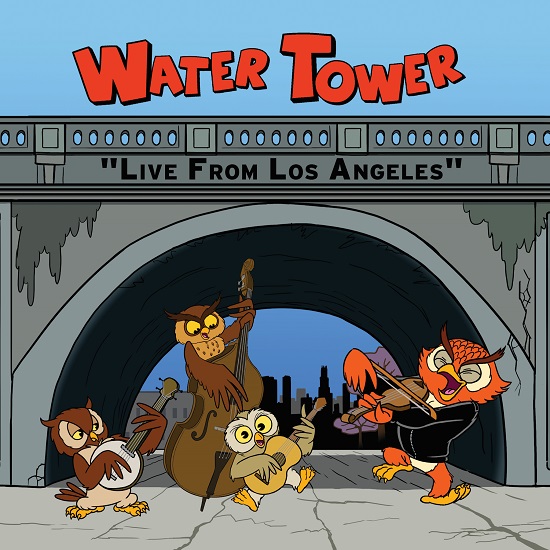
So, no pressure then. Palomino Studios in LA was booked by Water Tower for the day after a two-month tour while the tour energy was still fresh and everything would be recorded live in one day. It was traditionally the way string bands recorded; get everyone around a mic and the volume adjustment is done by moving away from or closer to it. Should have been relatively easy until the car broke down and the upright bass fell apart cutting four hours out of their session time. And they only managed to limit the songs to fifteen (or sixteen if you split out the opening segue). No pressure at all but, for performing musicians shit like this happens day in and day out. I’ll come back to that later.
I like the idea of the traditional string band; musicians who play and sing to a really high standard in a live or studio setting while keeping an Appalachian tradition alive. But things also move on and Water Tower do a couple of things that help keep the style fresh; they approach it with a sense of humour (not untypical in string bands) and they happily throw in influences from other musical styles and not always what you might expect; how about the percussive acoustic guitar-led cover of Tupac’s ‘California Love’? The link is the location, but I certainly wouldn’t have seen that one coming.
The album opens with a solo banjo version of ‘The Star-Spangled Banner’ (no Hendrix pyrotechnics, just tight, technical playing featuring some nice double-stopped passages) which leads into a cover of Doc Watson’s ‘Reuben’s Train’ showcasing the talents of all the players. The traditional string band tunes that give all the players the chance to improvise and show their abilities form the backbone of the album; ‘I See the Light’ is a slow triple-time piece with a high-register Kenny Feinstein vocal and intertwining banjos, ‘Lonesome Blues’ rattles along with instrumental virtuosity and superb harmonies and ‘Stay the Night’ flies along at breakneck speed hinting at the pace of the recording process, particularly in the spoken outro. And there’s a version of ‘Cotton Eyed Joe’ (yep, the same one that Swedish band Rednex covered when the UK rave scene finally jumped the shark).
These tunes are all great fun but the album becomes really distinctive when the influences that the induvial band members bring feed into the songs. ‘Radio’ is punk Americana with a couple of Clash references, ‘George Washington’ highlights our mortality and transience while taking a sideswipe at internet conspiracy theories and ‘Skante Warrior’ digs into the dark world of meth-heads which is contrasted with the gorgeous falsetto Beach Boys/Four Seasons harmonies. And then ‘AM PM’, with a Jackson Browne/David Lindley feel is a very rare thing indeed, a song about supermarket price offers.
Coming back to the recording process, everything was recorded live in two takes for each song and it’s mainly the first takes that feature on the album. There are three things about this album that grabbed my attention; the playing and singing are outstanding, it feels like the band are having fun and it made me explore a concept that I had no knowledge of (the urban mythology of meth-heads explored in ‘Skante Warrior’). Enjoyment and instruction.
‘Live from Los Angeles’ is a great capture of the live energy of Water Tower and it’s released in the UK on Friday August 11th. If you want to capture the real thing in the UK, Water Tower will be touring the UK and Ireland from August 10th. You can find the dates here.
As an extra bonus, here’s a live video of ‘Take Me Back’:
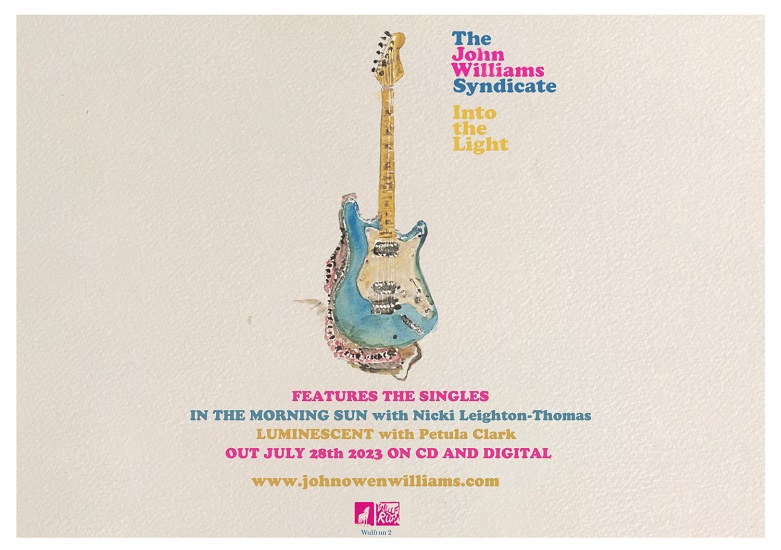
‘Into the Light’ is the second John Williams Syndicate album. My only minor reservation about the first album ‘Out of Darkness’ (both titles inspired by the motto of his hometown, Wolverhampton) was that with so many guest performers it lacked a little bit of cohesion. That certainly doesn’t apply to ‘Into the Light’. There’s still a long list of guest performers but John has conjured up a unity for the album with a sixties feel combined with twenty-first century production techniques that makes it feel simultaneously contemporary and nostalgic, drawing on all of his previous experience as record plugger, label manager, head of A&R, producer, songwriter and recording artist.
For the second album, John has stuck with the idea of combining established artists with relative newcomers to the business. There are guest vocals from the legendary Petula Clarke, Claudia Brücken, Nicki Leighton-Thomas and John Moore (of Jesus & Mary Chain and Black Box Recorder fame) while the relative newcomers and under the radar guests are represented by Natasha Panas, rapper/singer Slicko and Isabella Coulstock (currently supporting The Who after a tour supporting Jools Holland). John blends all of these elements together seamlessly with his arrangements and production.
Of the ten tracks on ‘Into the Light’, there isn’t one that has the finger even hovering over the skip button and they work beautifully together, however I do have to mention a few of my own personal highlights. ’You’re My Number One’ works perfectly on all levels; it’s a list song packed with sixties and seventies references driven along by an incredibly catchy guitar hook and a Nicki Leighton-Thomas vocal at the lower end of her range that evokes Marianne Faithfull from her gravelly ‘Broken English’ incarnation. ‘In My Dreams’ is also full of musical and lyrical historical references. Petula Clarke shines vocally on ‘Luminescent’, which is driven along by a simple repeated piano figure, while Claudia Brücken does the same on the Portishead-influenced ‘As Long As You are there for Me’ which builds gradually from a drum pattern and guitar feedback before finishing on stripped-back piano and vocal. ‘I Want to Lose Myself in You’ is a bit of fun that opens with an organ intro that hints at Vanity Fare’s ‘Hitchin’ a Ride’ and maybe ‘I’m Always Touched by your Presence Dear’. Just imagine Blondie with a banjo.
It’s also great to see that John, as he did with ‘Out of Darkness’, is bucking the streaming/download trend. The CD version of this album comes with sumptuous packaging that enhances the musical experience. ‘Into the Light’ succeeds in the same way that St Etienne did in the nineties by capturing the mood and feel of an earlier while era using contemporary production techniques. It’s a tricky one to get right, but this album aces it.
‘Into the Light’ is released on Friday July 28th on Wulfrun Records (Wulfrun2).
Here’s the video for ‘In the Morning Sun’:
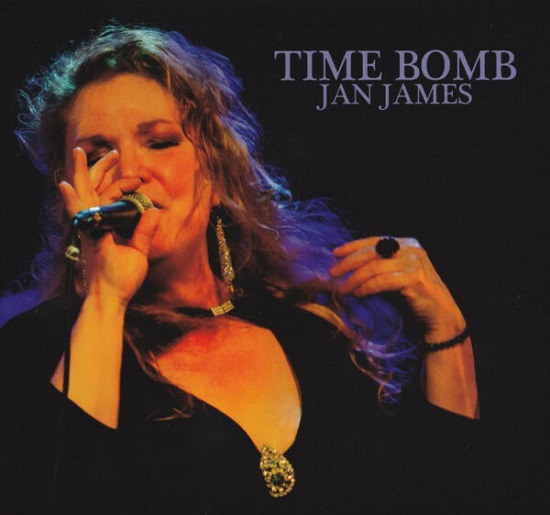
There’s a sweet spot where blues, rock and soul intersect with big guitar riffs, keys and horns. Chicago found it in the seventies, Southside Johnny has made it his lifetime’s work and Springsteen hit it perfectly with his soul covers album ‘Only the Strong Survive’. ‘Time Bomb’ is right in the centre of that sweet spot. Jan James has, as they say, paid her dues on the local Chicago scene in clubs, festivals and theatres, picking up a lot of respect along the way.
The influences she’s been exposed to shine through on ‘Time Bomb’, from the opening jazzy lilt of ‘Swingin’ in the Sweet Sunshine’ to the pure blues of the appropriately-named closing song ‘Always the Blues’. There are songs in traditional blues stylings; ‘Too Late Now’ is a slow blues given a country tinge with the piano part ‘Let Love Surround You’ is a slow blues, opening with a clipped guitar part that gives way to an over-driven guitar in the chorus. What’s noticeable on the album is that although Jan James has a powerhouse voice, it’s kept under a tight rein most of the time and doesn’t very often get into Janis Joplin territory.
‘Don’t It Feel Good’ has a midtempo soul feel while the anti-materialistic ‘Diamonds and Gold’ and the femme fatale song ‘Time Bomb’ both hint at eighties productions. The songs that jump out as being a little different are the two that address social and political issues. In Jan’s words, “All of the songs from ‘Time Bomb’ are inspired by the times we are living in.” ‘Desperate Times’ is a slow piece with some subtle keys that laments the state of the world but acknowledges that we all still need to carry on. ‘Blood on Your Hands’ has a much more direct message; it’s squarely aimed at Donald Trump for his part in the January 6th insurrection and it’s angry, very angry.
If you’re expecting an album of standard 12-bar blues tunes, ‘Time Bomb’ should be a pleasant surprise. You’ll find classic blues but you’ll also find elements of soul, country, swing, eighties FM rock and more besides. The arrangements are all classy and Jan’s vocal, which can go all the way to eleven on the raucous scale, is generally controlled throughout the album; powerful but controlled, and it’s refreshing to hear a few elements of the protest song in the mix as well. ‘Time Bomb’ is a collection of songs that work on a musical and lyrical level with some powerful and restrained musical performances. What’s not to like?
‘Time Bomb’ is released in the UK on Friday July 27th on Blue Palace Records (BPR 33318).
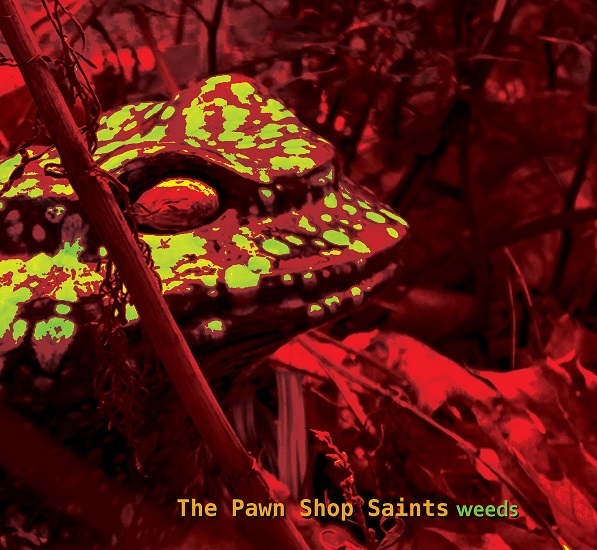
Paddy McAloon described the working title of his 1990 Prefab Sprout masterpiece ‘Jordan: The Comeback’ as ‘Death and Elvis’. Jeb Barry could have had a working title of ‘Death and Death’ for his third pandemic album ‘Weeds’. Jeb’s inclination is naturally towards the melancholic and the album centres around the impact of COVID and the impact of the death of John Prine in particular, so don’t expect too many laughs. The songs are beautifully constructed miniatures with sparse arrangements built around acoustic guitar and bass with additional colour from occasional accordion, banjo, harmonica and fiddle solos and fills. The production, co-helmed with long-time collaborator Josh Pisano has a very organic live folk feel, keeping Jeb’s vocal front and centre and sometimes doubled up to reinforce its plaintive, keening quality. Across the album, Jeb’s voice emphasises and accentuates the painful subjects of the songs.
The opening song on ‘Weeds’ is almost cheerful in that it’s only about a break-up rather than a death. It’s the album’s obligatory Big Star-ish song and comes complete with an accordion solo; from there on, things get a bit darker, apart from the slide guitar-punctuated title song which talks about the metaphorical weeds we trip over before the song turns to positivity with angels watching over us.
Most of Jeb Barry’s songs are Carver-style vignettes, picking up on small events in people’s everyday lives. The death of ‘Miss June’ echoes the lonely death of the more famous ‘Eleanor Rigby’, while ‘Preacher’ and ‘All Girls Break Hearts’ are fairly straightforward stories of broken romances. The really punchy songs for me on ‘Weeds’ are the ones where personal stories are intertwined with social or political themes.
‘The COVID Unit’ combines the idea of losing people to the virus with the selfishness or stupidity of people refusing to wear masks over a mid-tempo country rock arrangement while ‘Generation Lockdown uses a similar styling to combine themes of lockdown and its impacts with the other American virus of school shootings, which is particularly relevant as Jeb’s day job is teaching high school. There’s a gentle power in every song on the album; ‘The War’ is an exploration of PTSD, ‘James’ deals with coping with the untimely death of an old friend, while ‘Twine’, a song about barely holding things together, is a tribute to John Prine.
Jeb Barry describes ‘Seeds’ as his folk album. The arrangements are mainly traditional string band stylings and there are elements of protest in the songs as well. There are many fascinating stories, all sung in Jeb’s laconic, fragile high tenor with arrangements that rely on feel and skill rather than power and clever studio techniques. It’s organic without descending into lo-fi territory. Every song fits in neatly, even the singalong (shoutalong?) simplicity of ‘Baby Got Drunk’. There are stories and messages aplenty and you can’t beat an album that begins with a song that’s a tribute to Alex Chilton.
‘Weeds’ is released in the UK on Dollyrocker Records (DR20231) on Friday July 21st.
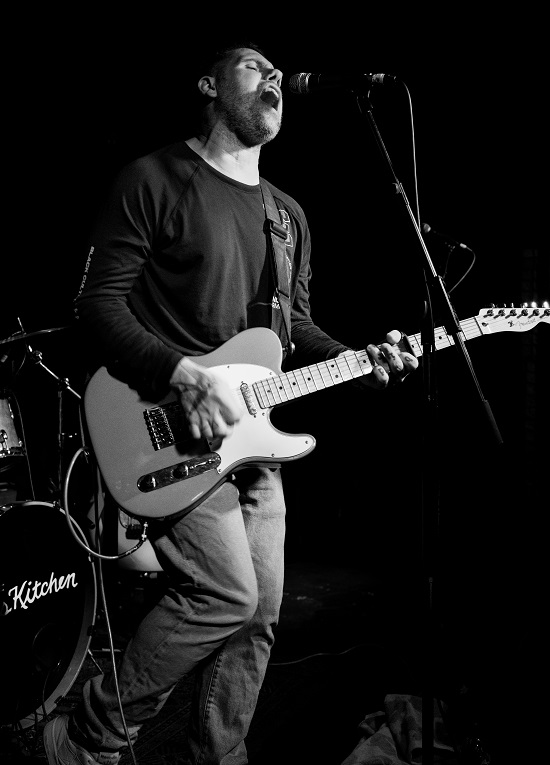
I see a lot of artists performing live on the independent London circuit; most of them are good, some of them are great and occasionally you hear something that blows you away. I’ve had a couple of those over the last few years; one of them was the first time I saw Si Connelly play a band set live at Hope and Anchor in November 2021. What I saw left me absolutely stunned; a performer who took the stage in a basement in Islington and held nothing back in his playing and vocals and he was photographic gold; so expressive and so committed. I was hooked and I’ve caught as many of his shows as I can since then, including the launch for his latest album ‘Nevertheless’ a couple of weeks ago. at Blues Kitchen in Brixton.
In 2022, Si released an EP every month and he’s moved on to albums this year. To say he’s prolific as a songwriter is a huge understatement, but it’s not just about quantity; the songs are all superbly crafted and the performances, particularly the vocals, are out of the top drawer. About those vocals; Si’s range is exceptional, particularly at the high end and he uses it to great effect both in the studio and live. So, what about ‘Nevertheless’?
It’s an album that demonstrates the breadth of Si’s writing, playing and singing; from the big rock riff opener ‘Gimme More’ to album’s gentle closer ‘Sea of Change’ with its folk feel and stripped back vocal and acoustic guitar treatment. It’s a lot like Neil Young, moving seamlessly from introspective acoustic to rock-out electric. Si’s equally adept at either end of that scale.
There’s an art that great songwriters and performers have of incorporating influences without actually stealing anything and there are couple of great examples of this on ‘Nevertheless’. ‘Hold Me’, with its huge dynamic range is a nod in the general direction of Prince’s ‘Purple Rain’, while ‘How Do You Love Me’, with its sixties soul feel emphasised by the keyboard parts, hints at the lyrical structure of Sam Cooke’s ‘You Send Me’ repeating lines with slight changes as the verse unfolds.
If you need an introduction to Si’s work, ‘Nevertheless’ isn’t a bad place to start. It features rock, soul and acoustic elements and demonstrates Si’s powerful use of dynamics while showcasing his exceptional voice. It’s a great piece of work but I can’t leave this without saying that you can only get the full Si Connelly experience by seeing him play live either solo or with his band – that’s an experience you won’t regret and you won’t forget.
‘Nevertheless’ is out now on all of the digital platforms.
Find it here on Spotify:
Here’s the video for ‘Winter’s Song’:
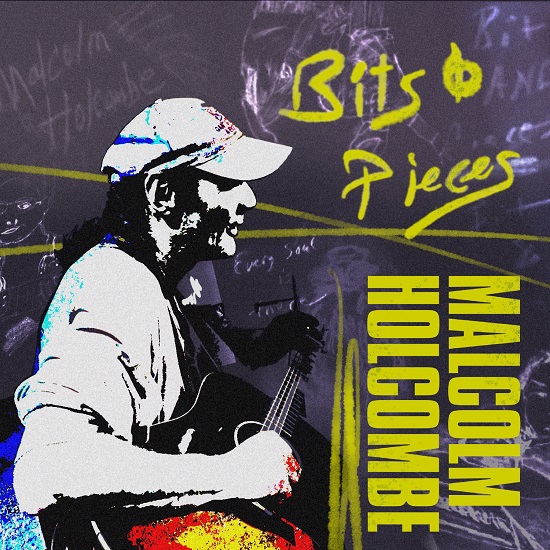
It’s easy to see why Malcolm Holcombe is admired by so many songwriters. His lyrics are economical, perhaps even terse at times, conveying ideas and stories by hints and allusions rather than as a simple narrative and creating rhythmic textures with his finger-picking style. The album’s a two-hander with Jared Tyler supplying tonal colours to Malcolm’s songs (as he has for nearly twenty-five years) with a wide variety of instruments including dobro, lap steel, baritone guitar, tenor banjo, mandola and percussion. Malcolm’s finger-picking and Jared’s backing and fills give the songs a rhythmic complexity that emphasises the starkness of the lyrics.
‘Bits & Pieces’ is an album where Malcolm takes a long look in the rear-view mirror at the times he’s enjoyed and the times he’s survived; there’s a reason for this. Malcolm was diagnosed with cancer in 2022 and decided to record these songs straight away because of the uncertain future. He’s now a cancer survivor as well and this is referenced in ‘Bootstraps’ with the lines “blood bleedin’ in your stomach, saline flowin’ your veins”. Malcolm’s lyrics can be oblique, leaving you wondering whether you’re chasing the right reference, although it’s clear that ‘Eye of the Needle’, ‘Rubbin’ Elbows’ (with the COVID reference) and ‘Another Sweet Deal’ are talking about hucksters and grifters and possibly even the Trump family. You can find a few religious references in there as well, in ‘Eye of the Needle’ mentioned above, ‘Bring to Fly’ and ‘Conscience of Man’. Sometimes you need to delve a little to unpick the references, but it’s always worth the effort.
There are a couple of standouts for me and they’re side by side on the album. ‘The Wind Doesn’t Know You’ takes a whistle-stop tour through Malcolm’s past (‘lock the doors and windows turn the music up louder, from the eighties to the nineties from the pills to the powder’) before acknowledging that in the grand scheme of things, we play a very small part. ‘Conscience of Man’ hints at the early Eagles albums in its arrangements and harmonies as it rails at the American right wing before admitting that redemption might just be possible. And the theme of redemption suffuses the album’s closer ‘Bring to Fly’ to end the album on a positive note.
If you already know Malcolm Holcombe’s work, you’ll find this a very satisfying album. If you don’t know his work, then this is a pretty good place to start.
‘Bits & Pieces’ is out now on Proper Music/Need To Know.
Here’s the lyric video for the album’s title song:


